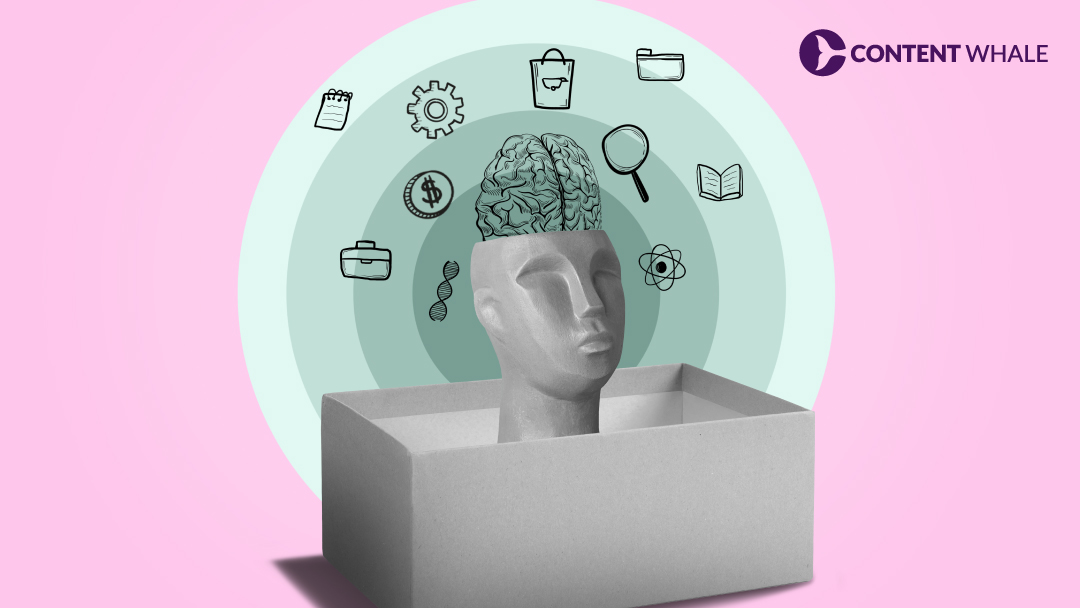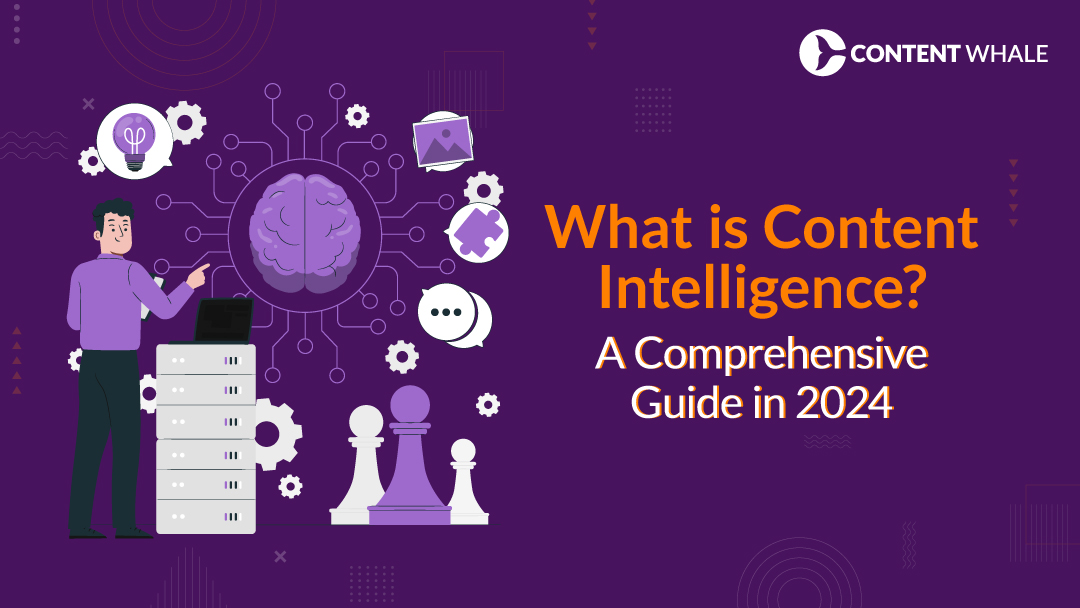Content Intelligence is a dynamic approach to marketing that employs data analysis, artificial intelligence (AI), and machine learning to enhance content creation and distribution. What is Content Intelligence if not a critical tool for 2024’s fast-paced digital environment? It is vital for any business looking to stay ahead.
Based on our studies, this guide will explore the strategic advantages of content intelligence, showcasing how it can revolutionize marketing strategies, personalize customer interactions, and significantly improve engagement and conversions.
In our experience, implementing content intelligence effectively means businesses can anticipate customer needs more accurately and optimize their marketing efforts efficiently.
1. What is Content Intelligence?

Content intelligence systems turn raw data into actionable insights, equipping marketers to develop strategies that connect profoundly with their audience. At its heart, content intelligence employs AI to scrutinize user data and content performance, furnishing businesses with insights into which types of content succeed and the reasons behind their success.
According to our findings, content intelligence significantly bolsters content creation and sharpens its relevance and engagement by tailoring user experiences through comprehensive data analytics. This adaptive approach ensures that businesses can optimize their strategies in real-time to foster deeper customer relationships and enhance overall content efficacy.
2. How Does Content Intelligence Work?
Content intelligence functions by collecting data from various sources, including user interactions, feedback, and content performance metrics. This data undergoes analysis with sophisticated analytical tools and AI to extract patterns and insights that are critical for strategic decision-making.
Based on our studies, AI plays a pivotal role in content intelligence by identifying trending topics, enhancing content intelligence for search engines, and suggesting real-time content adjustments based on user engagement and behaviour patterns. This process not only streamlines content optimization efforts but also ensures that content strategies are aligned with audience needs and preferences, thereby increasing the effectiveness of marketing campaigns.
3. What are the Benefits of Content Intelligence in Marketing?
The adoption of content intelligence in marketing strategies significantly boosts ROI by enhancing the relevance and engagement of content. For example, businesses can leverage insights from content intelligence to customize their marketing messages, which often results in higher conversion rates and stronger customer loyalty.
In our experience, real-world applications have demonstrated that content intelligence streamlines content production processes, enables real-time adjustments to marketing campaigns, and elevates overall content effectiveness. This strategic integration ensures that businesses are not only keeping pace with market dynamics but are also able to anticipate customer needs, thereby securing a competitive advantage in their industries.
How to Implement Content Intelligence Efficiently?

1. Setting Up Your Content Intelligence Framework
Choosing the right content intelligence platform involves considering factors such as its ability to integrate with existing tools, the sophistication of its AI capabilities, and the quality of analytics provided. What is content intelligence if not the seamless functionality and integration with existing marketing tools? This allows you to leverage existing data effectively.
In our experience, a well-integrated content intelligence system enhances decision-making and refines your marketing strategy by providing actionable insights. Based on our studies, platforms that excel in understanding and processing complex data can significantly improve content outcomes and audience engagement.
2. Content Optimization with Intelligence Tools
Content intelligence platforms empower marketers to conduct A/B testing and a range of content experiments with ease. These tools support real-time adjustments to content, ensuring it remains dynamic and highly responsive to audience interests and behaviors.
Based on our studies, utilizing content intelligence for these purposes not only enhances the efficiency of content delivery but also ensures that the content continuously aligns with changing user preferences and market trends. This capability allows businesses to maintain a high level of engagement with their target audience, thereby maximizing the impact and reach of their marketing efforts.
3. Personalizing User Experience Using Content Intelligence
Content intelligence plays a pivotal role in personalizing the user experience. By analyzing user data, content intelligence tools can deliver experiences tailored to individual preferences, significantly enhancing engagement and conversion rates. These tools adeptly customize content recommendations and marketing messages, reflecting each user’s behavior and historical interactions.
In our experience, personalization driven by content intelligence not only attracts users but also keeps them engaged longer. Users exposed to personalized content are more likely to convert, underscoring the impact of content intelligence in practical applications.
Optimizing Relevance and Engagement with AI and Automation Strategies

AI and automation are increasingly pivotal in advancing content intelligence strategies by enhancing content relevance engagement and automating content creation and data analysis. Here are some strategies and tools that can significantly bolster your content intelligence efforts:
Predictive Analytics
Tools like Drift utilize AI to offer predictive insights that enhance customer interaction by personalizing communication based on user behavior observed over time. This can include anticipating customer needs and optimizing marketing messages accordingly.
AI-Driven Content Creation
Platforms like Jasper and WriteSonic are at the forefront of AI-powered content creation, providing tools for generating engaging and relevant content. These platforms use advanced algorithms to suggest content structures, tones, and even semantic keywords that can help your content perform better in search rankings.
Personalization and Optimization
MarketMuse and BrightEdge offer solutions that use AI to plan and optimize content. These tools analyze data to provide recommendations on content topics and strategies that are most likely to engage your target audience, thus improving the SEO and performance of your content campaigns.
Enhanced Customer Engagement
AI tools like Emplifi and Outreach are designed to enhance how businesses manage and interact with customers across various platforms. By automating interactions and using data to drive decisions, these tools help create a more personalized experience for users, which can lead to improved customer loyalty and conversion rates.
Operational Efficiency and Insight Generation
Platforms like Sensika and Sprout Social integrate AI with traditional marketing processes to streamline operations and generate valuable insights from large data volumes. This helps marketers identify trends, understand customer behavior, and craft more effective, data-driven strategies.
Market Research and Competitive Analysis
AI tools like Crayon provide competitive intelligence by monitoring and analyzing competitors’ online activities. This helps you understand market trends and refine your content strategy to better compete in your industry.
These strategies represent just a glimpse into how AI and automation are transforming content intelligence, making it a critical component for marketers aiming to stay ahead in an increasingly data-driven industry.
Best Tools to Transform Content Intelligence

Several advanced tools are currently transforming content intelligence by enhancing the relevance and engagement of content through AI and automation. Here’s how some of the leading platforms can bolster your content intelligence strategy:
ClickUp
Beyond its robust project management features, ClickUp includes an AI-powered writing assistant. This tool excels in content research, ideation, and copyediting, offering a holistic solution for teams aiming to refine their content creation process.
Bardeen
This tool leverages AI to automate repetitive tasks within your browser and syncs with over 50 apps, including GPT-4, to boost workflow automation. It’s particularly effective for data scraping and organizing web data, which are essential components of strategic content intelligence development.
ContentShake AI
Available through Semrush, ContentShake AI generates SEO-rich articles and captivating social media posts. It integrates competitive insights and streamlines article optimization for platforms like WordPress, making it a prime choice for effortless, high-ranking content creation.
MarketMuse
MarketMuse offers a detailed platform for content intelligence and SEO strategy management. It assists users in planning content, grouping content into clusters, and optimizing for search engines, thus enriching the content’s relevance and reach.
Jasper
Designed to simplify the writing process, Jasper includes features like automatic citation finding and plagiarism detection. Its powerful content generation capabilities make it an excellent option for creators intent on producing high-quality, engaging content efficiently.
Each tool mentioned here provides unique capabilities, from automating mundane tasks to generating and optimizing content. These innovations empower marketers to utilize advanced AI technologies effectively. By simplifying the content creation process and ensuring content is optimized for both users and search engines, these tools significantly enhance overall marketing effectiveness.
Analyzing and Reporting with Content Intelligence
Effective content intelligence strategies rely on robust analytics and detailed reporting to measure performance and guide decision-making. In this context, content intelligence involves tracking key metrics that allow marketers to understand the impact of their content, adjust strategies in real time, and optimize for better results.
Based on our studies, tools that provide comprehensive analytics and visualization capabilities are particularly valuable in translating data into actionable insights. In our experience, businesses that effectively apply content intelligence are more adept at refining their marketing tactics and can more readily meet their strategic goals. This analytical approach ensures that each piece of content is not just created but crafted with precision to meet the dynamic needs of the target audience.
Optimizing Content Intelligence: Challenges and Best Practices

Implementing content intelligence presents distinct challenges and requires adherence to specific best practices to fully leverage its benefits effectively. Here’s an in-depth exploration of the critical aspects to consider:
1. What Are the Challenges in Optimizing for Content Intelligence?
Data Privacy and Security
Content intelligence heavily relies on user data, underscoring the need for stringent data management to comply with privacy regulations and ensure user data protection. Maintaining security is paramount as any lapse can significantly damage trust and compliance.
Integration Complexities
Integrating content intelligence into existing systems often involves considerable complexity. Ensuring compatibility and functionality across diverse platforms demands meticulous planning and execution.
Keeping Content Relevant and Authentic
As automation becomes more prevalent, keeping content authentic and relevant poses a significant challenge. There’s a risk of generating generic content, which can disengage your audience if not closely monitored.
2. What are the Best Practices for Content Intelligence?
Compliance with Data Protection Regulations
Strict adherence to data protection laws, such as GDPR, is critical. This involves obtaining clear consent for data usage, maintaining transparency about how data is used, and implementing robust security measures to protect this data.
Regular Updates and Maintenance of AI Algorithms
Regularly updating AI algorithms and systems is vital to ensuring that they remain effective. This proactive approach helps adapt to evolving content trends and digital environments.
Maintaining High-Quality and Relevant Content
Ensuring that the content remains high-quality, relevant, and aligned with the brand’s voice is essential. This balance is achieved through a combination of automated processes and human oversight, which ensures creativity and relevancy.
By concentrating on these best practices, businesses can navigate the challenges presented by content intelligence and maximize its potential for boosting marketing strategies and enhancing customer engagement. In our experience, businesses that effectively address these challenges often see improved outcomes in their digital marketing efforts.

Content intelligence is transforming the way businesses approach marketing, offering unprecedented insights and capabilities to tailor content like never before. What is content intelligence, you might ask? Simply put, it’s the use of data and AI technologies to improve content relevance and performance across various platforms.
Based on our studies, integrating content intelligence into your marketing strategy enhances the effectiveness of your campaigns and ensures you remain relevant in an increasingly data-driven marketplace. In our experience, businesses that leverage these insights can better meet their audience’s needs and see significant improvements in engagement and conversion rates.
Utilizing content intelligence allows for a deeper understanding of which types of content perform best and why. This, in turn, enables marketers to craft strategies that are not just reactive but proactive, predicting trends and customer behaviors before they become apparent.

What is Content Intelligence?
Content intelligence is the application of AI and data analytics aimed at enhancing content relevance and engagement. This technology empowers marketers to tailor content more precisely to user needs, thus improving interactions and outcomes.
How Does Content Intelligence Improve Marketing ROI?
By implementing content intelligence, businesses can foster personalized content strategies that dramatically increase engagement and conversions. Based on our studies, this tailored approach is key to boosting ROI, as it aligns content more closely with user preferences and behaviors.
Can Small Businesses Benefit from Content Intelligence?
Absolutely, content intelligence levels the playing field, offering small businesses the kind of insights that were traditionally available only to larger entities. This accessibility helps small enterprises compete more effectively in their markets.
What Are the Best Content Intelligence Tools Available Today?
The most effective tools in content intelligence are those that provide robust analytics, advanced AI capabilities, and integrate seamlessly with existing platforms. These tools are essential for businesses looking to gain a competitive edge through enhanced content strategies.
How Does AI Enhance Content Intelligence Capabilities?
AI enhances content intelligence by automating data analysis, generating tailored content recommendations, and personalizing user experiences. This automation makes marketing efforts more targeted and efficient, significantly improving campaign performance.
What Future Trends Should Marketers Watch in Content Intelligence?
The future of content intelligence is shaped by several key trends:
- AI-driven Personalization: Advanced AI helps analyze user data more effectively, enabling deeper and more precise personalization.
- Multimedia Content Expansion: As different content formats gain popularity, marketers are expected to adopt a broader range of media, including videos, podcasts, and interactive content.
- Voice and Visual Search Optimization: With the rise of voice and visual search technologies, content intelligence tools must evolve to optimize content for these platforms.
- Ethical AI and Transparency: There is a growing focus on ethical AI use and transparency about how data is utilized within tools, ensuring compliance with privacy laws and consumer expectations.
- Integration of AI with Traditional Marketing Tools: AI is enhancing content creation and being integrated with traditional marketing tools to streamline processes and improve data synchronization across platforms.
These trends underscore a move towards more dynamic, personalized, and ethically responsible marketing practices that leverage cutting-edge AI technologies. As these tools evolve, they present exciting opportunities for marketers to refine their strategies and achieve greater success.





